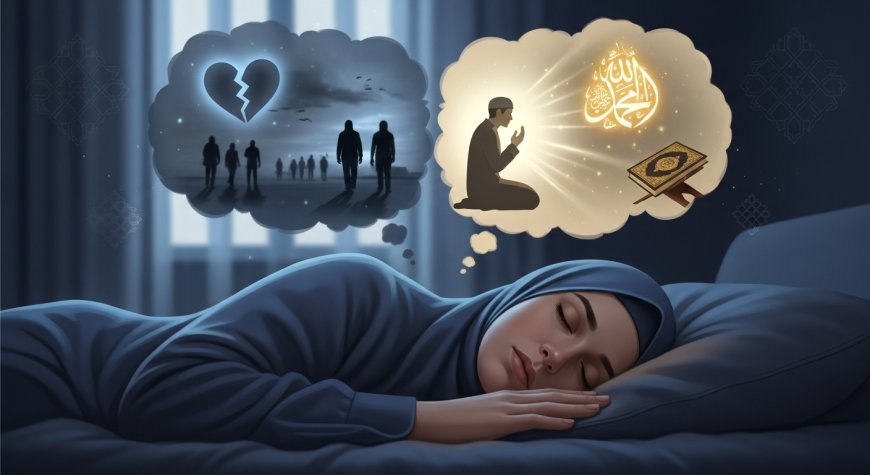Top 10 Verses About Visions and Dreams in the Holy Quran
we present the noble verses that mention visions and dreams. Visions and dreams are considered an important matter in Islamic creed, as evidenced by their mention in numerous places in the Holy Quran.

Introduction
Ever wondered what Islam says about dreams and visions? In the Holy Quran, dreams are not seen as randomtheyre powerful tools for divine communication. Throughout the stories of the prophets and key figures in Islamic history, visions and dreams are used by Allah to guide, warn, and inspire. In this article, well explore the top 10 verses about visions and dreams in the Holy Quran and uncover their deeper spiritual meanings.
1. Surah Yusuf (12:4) Yusufs Childhood Dream
O my father! Indeed I have seen eleven stars and the sun and the moonI saw them prostrating to me.
This dream was seen by Prophet Yusuf (Joseph) as a child and later came true. His dream showed the symbolic power of visions in revealing future events, especially in the lives of the prophets.
2. Surah Yusuf (12:43) Pharaohs Dream
Indeed, I saw seven fat cows being eaten by seven lean ones
This dream was sent to a non-believer (the Pharaoh), yet it held a powerful message. Prophet Yusuf interpreted it correctly, showing how dreams can contain hidden knowledge about future calamities.
3. Surah As-Saffat (37:102) Prophet Ibrahims Vision of Sacrifice
O my son, indeed I have seen in a dream that I must sacrifice you
This powerful vision wasnt just symbolicit was a divine test of obedience and trust in Allah. It also became the origin of the practice of Qurbani (sacrifice) during Eid al-Adha.
4. Surah Al-Fath (48:27) Prophet Muhammads ? Vision of Makkah
Certainly did Allah show His Messenger the vision in truth...
The Prophet ? saw himself and his companions entering Masjid al-Haram in peacea vision that soon came to pass. It reassured the believers and strengthened their faith during a time of uncertainty.
5. Surah Yusuf (12:100) Yusufs Dream Fulfilled
And he raised his parents upon the throne, and they bowed to him in prostration...
Years after his childhood dream, this verse confirms the fulfillment of Prophet Yusufs vision. It proves that dreams in the Quran are often prophetic and unfold in real life.
6. Surah Al-Anfal (8:43) The Prophets Dream Before Battle
When Allah showed them to you in your dream as few
Before the Battle of Badr, Allah made the Prophet ? see the enemy troops as fewer in number. This dream gave courage to the Muslims and helped strengthen their resolve.
7. Surah Al-Isra (17:60) A Vision Meant to Test
And We did not make the vision which We showed you except as a trial for the people...
This mysterious vision refers to a scene shown to the Prophet ? that caused doubt among disbelievers. It shows that some visions are meant to test peoples faith.
8. Surah Al-Saffat (37:105) Obedience Through Vision
You have fulfilled the vision.
These words confirmed Prophet Ibrahims submission to Allahs will. His dream was a divine command, and his obedience became a model of faith for generations to come.
9. Surah Al-Hujurat (49:6) Warning Against Acting on False Information
While not directly about dreams, this verse teaches a key principle for interpreting visions:
If a sinner comes to you with news, verify it...
This applies to dreams toowe must seek knowledge and avoid acting on them without verification.
10. Surah Maryam (19:17-19) Maryams Spiritual Encounter
Though not a traditional dream, Maryams encounter with the angel is often described as a spiritual vision, demonstrating that Allah sends His messages through both dreams and waking revelations.
The Islamic View on Dreams and Visions
According to Islamic teachings, dreams fall into three categories:
True Dreams (Ruya): Sent by Allahclear, meaningful, and often seen by the pious.
False Dreams: Caused by Shaytan to scare or confuse.
Self-Reflective Dreams (Nafs): A reflection of your thoughts, feelings, or worries.
Dreams are not always messages. But when they are, they can offer guidance, warning, or good news. The Quran proves that some of the most pivotal moments in prophetic history were revealed through dreams.
What to Do If You Have a Powerful Dream
Write it down immediately.
Compare it with the stories of the prophets.
Avoid sharing bad dreams.
Thank Allah for good dreams.
Consult a knowledgeable Islamic scholar for interpretation.
Conclusion
The verses about visions and dreams in the Holy Quran teach us that dreams can carry divine wisdom, predictions, and tests. From Yusufs childhood dream to the Prophet Muhammads ? visions of victory, each dream played a critical role in shaping Islamic history.
In Islam, dreams are a window into a world beyond the physicalsometimes symbolic, sometimes literal, always full of meaning. But we must approach them with knowledge, sincerity, and humility.
FAQs
1. Are dreams considered real in Islam?
Yes, especially true dreams (Ruya) which are believed to be a form of revelation for the pious.
2. Can dreams predict the future?
In some cases, yesmany dreams in the Quran foretold future events.
3. Should I act on a dream?
Only if it aligns with Islamic teachings and after seeking proper guidance. Never make decisions based on dreams alone.
4. Can Shaytan influence dreams?
Yes. False dreams often come from Shaytan to disturb or confuse the dreamer.
5. Who can interpret dreams in Islam?
Qualified scholars or righteous individuals with deep knowledge of the Quran and Sunnah.

































